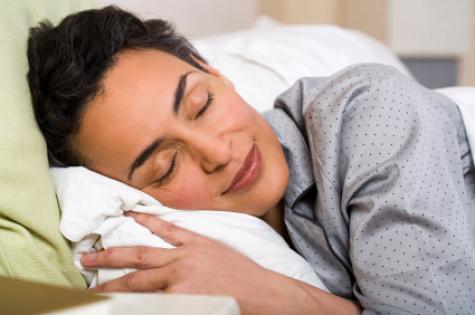Just had lunch but still hungry? Experience mid-morning headaches? Or lost your sex drive? Reaching for that alarm clock off switch isn’t always a result of Monday blues or the dread of a winter walk to the bus stop.
But all of these could be signs that you’re not getting the sleep your body is craving.
According to recent research of American women by Harris Interactive, lack of sleep has a profound impact on many areas of life.
- Nearly 6 out of 10 are less motivated to be physically active.
- Almost half believe they gain weight due to lack of sleep.
- More than 40% find it hard to concentrate at home or at work, with 17% saying tiredness has an impact on their career.
- Almost as many say it makes them feel ‘cranky’.
- More than 35% say their sex life is negatively impacted.
- About one-quarter say it’s putting stress on their key relationships.
“It can be difficult to identify why you’re emotional, unfocussed, or just can’t shake that cold. Sometimes you may find yourself eating all day or even disinterested in your partner - these can all be symptoms of sleep deprivation or an interrupted sleep,” says someone who hears a lot about sleep, CEO of Bedsonline.com.au, Cliff Sneider.
“Anyone experiencing these symptoms may find almost instant relief from altering small aspects of their regular routine. If not, then a trip to the doctor is recommended to discuss the issue and determine the right support.”
Cliff Sneider says there are many factors, such as the position of your body in bed, your pre-bed ritual and even diet, that effect how you feel when we wake up in the morning. He says in his business he has come across nearly every sleep issue that’s out there and, by providing some simple tips learned through experience, has managed to improve sleep quality for most sufferers.
“The amount of sleep each individual requires can vary and by trying to increase the time you’re asleep gradually each night, you will eventually find what is right for you. Keep in mind that if you’ve been deprived of sleep for an extended period of time, it will take longer to get back into a healthy pattern,” says Cliff Sneider.
Dr Ann Rogers from Harvard Medical Schools says the average adult should get 7-9 hours of sleep daily for optimum health and function.
“More than 60% of women routinely fall short of that goal. It may be due to insomnia or other underlying condition that may require medical attention.
“But most women with a sleep debt run it up by burning the candle at both ends — consistently failing to get to bed on time or stay there long enough.”
Dr Rogers says it is possible to repay a chronic sleep debt.
“Doing so can have a profound effect on your daily well-being and long-term health. Think of getting enough sleep - at least seven hours a night - as being just as important as eating a healthy diet and getting regular exercise,” says Dr Rogers.
Here are eight top tips for getting more sleep drawn from Dr Rogers and her colleagues at Harvard Medical School and Cliff Sneider’s practical experience at BedsOnline.com.au
1. Create a sleep sanctuary
Reserve your bedroom for sleep and intimacy. Keep it dark and on the cool side. Cliff says the ideal temperature is 18-20 degrees. Banish the television, computer, mobile phone or digital organiser, and other diversions from your sleeping space and, if possible, try not use them for at least an hour beforehand!
2. Try to unwind
You may try stretching, relaxation exercises, a hot shower or bath, meditation, or a glass of hot milk or herbal tea to calm the body. If you’re faced with a task that may cause you frustration or a conversation that may anger you, avoid it until the morning.
3. Nap only if necessary
Napping an hour or two at the peak of sleepiness in the afternoon can help to supplement hours missed at night. But naps can also interfere with your ability to sleep at night and throw your sleep schedule into disarray.
4. Avoid caffeine after noon, and go light on alcohol
Caffeine can stay in your body for up to 12 hours. Alcohol can act as a sedative, but it also disturbs sleep, especially if you have too much.
5. Get regular exercise
Exercise is a vital component of good sleep, but it also acts as a short-term stimulant. Don’t try to sleep within 2-3 hours of exercising.
6. Address a long-term debt - go on holiday!
If you’ve skimped on sleep for decades, it could take a while to recoup your losses.
Plan a holiday with a light schedule and few obligations — not a whirlwind tour of the museums of Europe or your daughter’s wedding. Then, turn off the alarm clock and just sleep every night until you awaken naturally. At the beginning, you may be sleeping 12 hours or more every night; by the end you’ll be getting about the amount you need to awake refreshed
7. Create a routine
Create a regular bedtime routine so your body knows it’s time for sleep. Try to go to bed and get up at the same time every day — at the very least on weekdays. If need be, use weekends to make up for lost sleep.
8. Find the right position
Sleeping on your side with your knees bent or with a pillow between your knees is the best way to maintain proper body posture.
If you must sleep on your back, place a pillow under your knees to support the normal curve of your lower back. Sleeping on your stomach or with your head elevated on an oversized pillow arches the natural curves of the back, and increases pressure on the diaphragm and lungs. These positions can lead to restless tossing and turning, leaving you tired the next day.



















__small.png)










